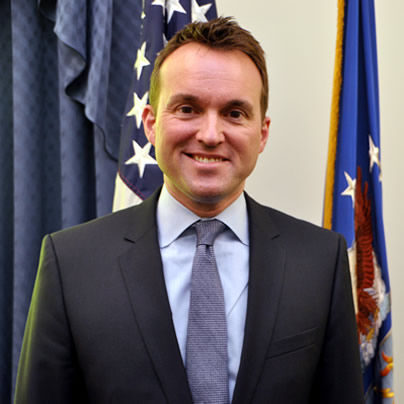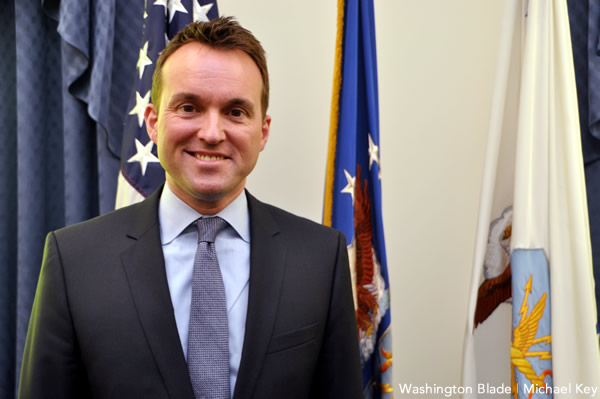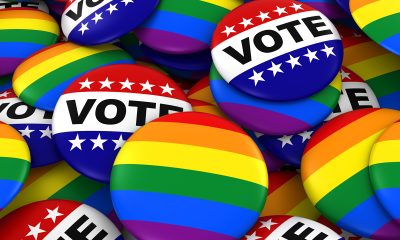Politics
Soaring at the Air Force
Under Secretary Fanning on his career and vision for an LGBT-inclusive military

After being bitten by the politics bug in 1988, a gay Dartmouth college student would abandon plans to pursue a career in architecture and instead move to D.C. where, years later, he would ascend the ranks to take on the second-highest civilian position in the U.S. Air Force.
It was the New Hampshire primary after eight years of Ronald Reagan that led Eric Fanning to shift his career trajectory to politics and policy.
“The campaign hooked me on politics. I found my way into an internship on the Hill and decided I wanted to come back,” Fanning said. “I got a great job on the House Armed Services Committee, which is not easy to do. I was very lucky to get that. The chairman of the committee, for whom I was research assistant, was, within 16 months, Clinton’s first defense secretary, so I was over here in the Clinton Pentagon. The path kind of wrote itself very early on.”
Fanning, 44, reflected on his career path and vision for an LGBT-inclusive Air Force during an interview with the Washington Blade in his office at the Pentagon on Wednesday — the first media interview he’s granted since the U.S. Senate confirmed him last month as under secretary of the Air Force by voice vote.
After his initial work on Capitol Hill, Fanning worked as special assistant to the Secretary of Defense, and associate director of political affairs at the White House. During the Bush administration, he worked for Business Executives for National Security, a D.C.-based think tank before joining the Commission on the Prevention of Weapons of Mass Destruction Proliferation & Terrorism.
Once President Obama assumed office, Fanning went to work as Deputy Chief Management Officer for the Department of the Navy and continued in that role until he was nominated in July for his role as Air Force under secretary. In that role as part of Air Force leadership, Fanning is responsible for affairs on behalf of the secretary of the Air Force, including organizing, training and equipping the service. Fanning, who’s single, lives in Logan Circle and works at the Pentagon.
Throughout his service in the government, Fanning has witnessed the enactment of “Don’t Ask, Don’t Tell” in 1993 as well as the ban on openly gay service members being lifted after President Obama signed repeal legislation in December 2010.
“‘Don’t Ask, Don’t Tell was implemented when I got here,'” Fanning said. “That wasn’t a particularly fun experience listening to the senior generals and admirals talk about those issues — now it was 20-plus years ago. It made this last round more rewarding just to see the change in the attitudes in the senior uniform leadership.”
Although he said he’s never felt like he’s been discriminated against while working at the Pentagon, Fanning said working for an institution that would have discharged him for being openly gay if he had served on the uniform side was “challenging” and he was on pins and needles as legislation to repeal the law met obstacles in Congress.
“I left the Pentagon before the re-election and then didn’t come back until this administration when we had a president who said he was going to end it,” Fanning said. “It was very difficult when we were getting to the end of the first two years and it wasn’t clear if we were going to be able to repeal ‘Don’t Ask, Don’t Tell.’ I didn’t know what I was going to do if we didn’t get the repeal through because some people couldn’t work because they were openly gay or lesbian.”
Fanning isn’t a stranger to LGBT advocacy work. From 2004 to 2007, he served on the board of the Gay & Lesbian Victory Fund. Fanning said he’s limited in the degree to which he can take part in LGBT organizations, but does contribute to pro-LGBT causes. Among them was a recent donation to Scouts for Equality, the organization the led the way for the Boy Scouts to approve a resolution ending its ban on gay youth.
“I think those organizations are important,” Fanning said. “It’s one of the reasons I gave so much time to the Victory Fund. But I don’t think there’s anything as important as just living an open life of integrity and productivity. … The more of us that are out and just doing the normal course of work of what we do as brothers, sisters, sons, colleagues, neighbors, I think that’s one of the most important things we can do.”
Chuck Wolfe, CEO of the Victory Fund, said Fanning represents what LGBT Americans can achieve and said his new role in the Air Force appropriately fits someone who helped elect LGBT people as a Victory Fund board member.
“Eric’s appointment is another positive step for LGBT Americans, who have begun to reject the idea that authenticity and public service are incompatible,” Wolfe said. “As a Victory Fund board member, Eric worked to make it possible for talented, committed leaders to serve the public regardless of their sexual orientation or gender identity. It’s fitting that he has now become a high-profile example of that mission.”
Like many gay Americans, Fanning said he’s closely monitoring the proceedings at the Supreme Court on two prominent gay rights cases: one challenging California’s Proposition 8, the other challenging the Defense of Marriage Act. Fanning said the case against DOMA is also professionally important to him because that law precludes major partner benefits — including health and pension benefits — from flowing to service members with same-sex partners.
“It has a significant impact on the Department of Defense as well because so many of these benefits conversations are tied up with DOMA, which is a federal law that we have to follow,” Fanning said. “In some ways, DOMA, which I think is a terrible law, made the repeal of ‘Don’t Ask, Don’t Tell’ easier because it took some of the more emotional issues off the table, but in terms of extending benefits, I think everyone who serves in uniform should have full access to legal benefits, and so, DOMA is the main roadblock to that.”
Fanning also takes the helm of the Air Force after an announcement in February that the Pentagon would extend to service members with same-sex partners limited benefits that are available to them under DOMA. Most of these benefits are the result of issuing these partners military IDs so they have access to commissaries and other programs. The goal to implement these is by by Aug. 31, but no later than Oct. 1.
“When we deploy airmen in this case, they need to know their families are being taken care of when they’re back home,” Fanning said. “The families are involved in deployments; we’re taking families away for extended periods of time. So, I think extending those types of benefits to people who are serving in uniform, volunteered for those risks is very important. So, I’m glad to see that it’s going forward.”
With the process leading to those benefits underway, Fanning also said he supports other outstanding initiatives sought by advocates — in particular the LGBT military group OutServe-SLDN — on behalf of LGBT service members while emphasizing he was speaking in a personal capacity in support of those ideas.
One of them was an explicit non-discrimination policy on sexual orientation in the military that would protect gay service members who feel they’re suffering discrimination or harassment. Currently, service members have no recourse for anti-gay discrimination outside of their chain of command. In respect to calls for an explicit non-discrimination policy, the Pentagon has consistently said it treats all service members with respect without committing to a new policy.
“Speaking personally, I always think it’s important to have non-discrimination policies codified to include everyone,” Fanning said. “The military, because it has a chain of command, has a different attitude about this and a different way to try to go about protecting airmen, sailors, soldiers, Marines — but Eric Fanning? Yes. I personally like to see these things in writing and codified.”
While some advocates have said President Obama should issue a non-discrimination executive order to protect gay service members, OutServe-SLDN has shifted its focus to calling on Defense Secretary Chuck Hagel to include out service members in non-discrimination and anti-harassment protections. Fanning said his preference is for the policy to originate from the Pentagon.
“My view about government is you should always use those resources that are available to you first before you move up to the next level, so I think there are a number of things we can do inside this building for the Department of Defense,” Fanning said. “If the president wanted to do that for the government at large, that’s a different issue, but we have the ability within the Department of Defense to codify this without having the president issue an executive order.”
Fanning also said he backs the idea of openly transgender service in the military. Currently, openly transgender people are unable to serve in the armed forces and face a medical discharge if their gender identity becomes known.
“I think that the military is stronger, institutions are stronger, and society is stronger the more inclusive that we are,” Fanning said. “So, wherever we can root out discrimination, I think it’s a positive thing.”
Allyson Robinson, executive director of OutServe-SLDN, praised Fanning for expressing support for the initiatives and said his vision for the military brings the institution into alignment with the 21st century.
“Under Secretary Fanning shares the same vision we have at OutServe-SLDN: a U.S. military that leads the nation in LGBT inclusion rather than lagging behind it,” Robinson said. “The steps he’s suggested would bring our armed forces in line with proven best inclusion practices of some of America’s most effective organizations, including our largest defense contractors, and of some of our strongest allies, like Great Britain and Israel. It’s encouraging to see this kind of forward thinking from one of our top military leaders.”
Politics
After Biden signs TikTok ban its CEO vows federal court battle
“Rest assured, we aren’t going anywhere,” CEO said

President Joe Biden signed an appropriations bill into law on Wednesday that provides multi-billion dollar funding and military aid for Ukraine, Israel, and Taiwan after months of delay and Congressional infighting.
A separate bill Biden signed within the aid package contained a bipartisan provision that will ban the popular social media app TikTok from the United States if its Chinese parent company ByteDance does not sell off the American subsidiary.
Reacting, TikTok CEO Shou Zi Chew said Wednesday that the Culver City, Calif.-based company would go to court to try to remain online in the U.S.
In a video posted on the company’s social media accounts, Chew denounced the potential ban: “Make no mistake, this is a ban, a ban of TikTok and a ban on you and your voice,” Chew said. “Rest assured, we aren’t going anywhere. We are confident and we will keep fighting for your rights in the courts. The facts and the constitution are on our side, and we expect to prevail,” he added.
Our response to the TikTok Ban Bill in the US: https://t.co/LpoE67sxHo
— TikTokComms (@TikTokComms) April 24, 2024
White House Press Secretary Karine Jean-Pierre adamantly denied during a press briefing on Wednesday that the bill constitutes a ban, reiterating the administration’s hope that TikTok will be purchased by a third-party buyer and referencing media reports about the many firms that are interested.
Chew has repeatedly testified in both the House and Senate regarding ByteDance’s ability to mine personal data of its 170 million plus American subscribers, maintaining that user data is secure and not shared with either ByteDance nor agencies of the Chinese government. The testimony failed to assuage lawmakers’ doubts.
In an email, the former chair of the House Intelligence Committee, U.S. Rep. Adam Schiff (D-Calif.), who doesn’t support a blanket ban of the app, told the Washington Blade:
“As the former chairman of the House Intelligence Committee, I have long worked to safeguard Americans’ freedoms and security both at home and abroad. The Chinese Communist Party’s ability to exploit private user data and to manipulate public opinion through TikTok present serious national security concerns. For that reason, I believe that divestiture presents the best option to preserve access to the platform, while ameliorating these risks. I do not support a ban on TikTok while there are other less restrictive means available, and this legislation will give the administration the leverage and authority to require divestiture.”
A spokesperson for U.S. Sen. Alex Padilla (D-Calif.) told the Blade: “Senator Padilla believes we can support speech and creativity while also protecting data privacy and security. TikTok’s relationship to the Chinese Communist Party poses significant data privacy concerns. He will continue working with the Biden-Harris administration and his colleagues in Congress to safeguard Americans’ data privacy and foster continued innovation.”
The law, which gives ByteDance 270 days to divest TikTok’s U.S. assets, expires with a January 19, 2025 deadline for a sale. The date is one day before Biden’s term is set to expire, although he could extend the deadline by three months if he determines ByteDance is making progress or the transaction faces uncertainty in a federal court.
Former President Donald Trump’s executive order in 2020, which sought to ban TikTok and Chinese-owned WeChat, a unit of Beijing-based Tencent, in the U.S., was blocked by federal courts.
TikTok has previously fought efforts to ban its widely popular app by the state of Montana last year, in a case that saw a federal judge in Helena block that state ban, citing free-speech grounds.
The South China Morning Post reported this week that the four-year battle over TikTok is a significant front in a war over the internet and technology between Washington and Beijing. Last week, Apple said China had ordered it to remove Meta Platforms’s WhatsApp and Threads from its App Store in China over Chinese national security concerns.
A spokesperson for the ACLU told the Blade in a statement that “banning or requiring divestiture of TikTok would set an alarming global precedent for excessive government control over social media platforms.”
LGBTQ TikToker users are alarmed, fearing that a ban will represent the disruption of networks of support and activism. However, queer social media influencers who operate on multiple platforms expressed some doubts as to long term impact.
Los Angeles Blade contributor Chris Stanley told the Blade:
“It might affect us slightly, because TikTok is so easy to go viral on. Which obviously means more brand deals, etc. However they also suppress and shadow ban LGBTQ creators frequently. But we will definitely be focusing our energy more on other platforms with this uncertainty going forward. Lucky for us, we aren’t one trick ponies and have multiple other platforms built.”
Brooklyn, N.Y.,-based gay social media creator and influencer Artem Bezrukavenko told the Blade:
“For smart creators it won’t because they have multiple platforms. For people who put all their livelihood yes. Like people who do livestreams,” he said adding: “Personally I’m happy it gets banned or American company will own it so they will be less homophobic to us.”
TikTok’s LGBTQ following has generally positive experiences although there have been widely reported instances of users, notably transgender users, seemingly targeted by the platform’s algorithms and having their accounts banned or repeatedly suspended.
Of greater concern is the staggering rise in anti-LGBTQ violence and threats on the platform prompting LGBTQ advocacy group GLAAD, in its annual Social Media Safety Index, to give TikTok a failing score on LGBTQ safety.
Additional reporting by Christopher Kane
Politics
Smithsonian staff concerned about future of LGBTQ programming amid GOP scrutiny
Secretary Lonnie Bunch says ‘LGBTQ+ content is welcome’

Staff at the Smithsonian Institution are concerned about the future of LGBTQ programming as several events featuring a drag performer were cancelled or postponed following scrutiny by House Republicans, according to emails reviewed by the Washington Post.
In December, Secretary Lonnie G. Bunch III appeared before a hearing led by GOP members of the Committee on House Administration, who flagged concerns about the Smithsonian’s involvement in “the Left’s indoctrination of our children.”
Under questioning from U.S. Rep. Stephanie Bice (R-Okla.), Bunch said he was “surprised” to learn the Smithsonian had hosted six drag events over the past three years, telling the lawmakers “It’s not appropriate to expose children” to these performances.
Collaborations with drag artist Pattie Gonia in December, January, and March were subsequently postponed or cancelled, the Post reported on Saturday, adding that a Smithsonian spokesperson blamed “budgetary constraints and other resource issues” and the museums are still developing programming for Pride month in June.
“I, along with all senior leaders, take seriously the concerns expressed by staff and will continue to do so,” Bunch said in a statement to the paper. “As we have reiterated, LGBTQ+ content is welcome at the Smithsonian.”
The secretary sent an email on Friday expressing plans to meet with leaders of the Smithsonian Pride Alliance, one of the two groups that detailed their concerns to him following December’s hearing.
Bunch told the Pride Alliance in January that with his response to Bice’s question, his intention was to “immediately stress that the Smithsonian does not expose children to inappropriate content.”
“A hearing setting does not give you ample time to expand,” he said, adding that with more time he would have spoken “more broadly about the merits and goals of our programming and content development and how we equip parents to make choices about what content their children experience.”
Politics
Survey finds support for Biden among LGBTQ adults persists despite misgivings
Data for Progress previewed the results exclusively with the Blade

A new survey by Data for Progress found LGBTQ adults overwhelmingly favor President Joe Biden and Democrats over his 2024 rival former President Donald Trump and Republicans, but responses to other questions may signal potential headwinds for Biden’s reelection campaign.
The organization shared the findings of its poll, which included 873 respondents from across the country including an oversample of transgender adults, exclusively with the Washington Blade on Thursday.
Despite the clear margin of support for the president, with only 22 percent of respondents reporting that they have a very favorable or somewhat favorable opinion of Trump, answers were more mixed when it came to assessments of Biden’s performance over the past four years and his party’s record of protecting queer and trans Americans.
Forty-five percent of respondents said the Biden-Harris administration has performed better than they expected, while 47 percent said the administration’s record has been worse than they anticipated. A greater margin of trans adults in the survey — 52 vs. 37 percent — said their expectations were not met.
Seventy precent of all LGBTQ respondents and 81 percent of those who identify as trans said the Democratic Party should be doing more for queer and trans folks, while just 24 percent of all survey participants and 17 percent of trans participants agreed the party is already doing enough.
With respect to the issues respondents care about the most when deciding between the candidates on their ballots, LGBTQ issues were second only to the economy, eclipsing other considerations like abortion and threats to democracy.
These answers may reflect heightened fear and anxiety among LGBTQ adults as a consequence of the dramatic uptick over the past few years in rhetorical, legislative, and violent bias-motivated attacks against the community, especially targeting queer and trans folks.
The survey found that while LGBTQ adults are highly motivated to vote in November, there are signs of ennui. For example, enthusiasm was substantially lower among those aged 18 to 24 and 25 to 39 compared with adults 40 and older. And a plurality of younger LGBTQ respondents said they believe that neither of the country’s two major political parties care about them.
-

 State Department3 days ago
State Department3 days agoState Department releases annual human rights report
-

 Maryland5 days ago
Maryland5 days agoJoe Vogel campaign holds ‘Big Gay Canvass Kickoff’
-

 Politics4 days ago
Politics4 days agoSmithsonian staff concerned about future of LGBTQ programming amid GOP scrutiny
-

 District of Columbia1 day ago
District of Columbia1 day agoCatching up with the asexuals and aromantics of D.C.











